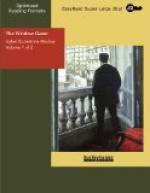“There is no real Mary.”
“Oh, Benis—isn’t she?”
“She positively isn’t.”
“But you said—”
“I lied, my dear. It was a jolly good lie, though.”
“A lie is never—”
“No, but this one was. You wouldn’t have married me if I hadn’t. And you told a whopper yourself once. You said that children—” but Desire refused to listen.
Later on, as they sat together on the log with a squirrel hiding provender in one of Desire’s slippers and another chattering agreeably in Benis’s ear, he told her briefly the history of the night. That is, he told her all that he thought it needful she should know. Of the scraps of diary in his pocket he said nothing,— some day, perhaps, when she had become used to happiness, and the cottage on the mountain was far away. But now—of what use to drag out the innermost horror or add an awful query to her memory of her mother’s death? The old man was gone—let the past go with him.
Desire listened silently. Sorrow she could not pretend. The suddenness of the end was shocking and death is ever awful to the young. But the eyes she lifted to her husband, though solemn, were not sad. When he had finished, she slipped into his hand, with new, sweet shyness, the letter which lifted forever the shadow of the dead man from across their path.
Benis Spence read it with deep thankfulness. Fate was indeed making full amends. No dread inheritance now need narrow the way before them. It meant—he stole a glance at Desire who was industriously emptying her slipper. The curve of her averted cheek was faintly flushed. The professor’s whimsical smile crept out.
“Let me!” he said. He took her slipper from her and, kneeling, felt her breath like flowers brush his cheek.
“It was a whopper, Benis,” Desire whispered.
Looking up, he saw the open gladness of her face.
The end



